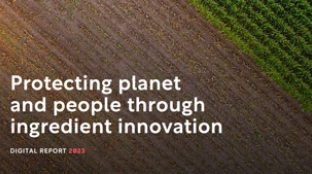The deepening climate crisis has been stirring both awareness and concern amongst consumers globally. A change in consumer attitudes has been witnessed and points towards growing interest in adopting more sustainable lifestyles, but most struggle to do so.
There is a real need to enable sustainable living by identifying and addressing the constraints that are holding consumers back. As we begin a new year and an often-associated desire to do better, we have assessed the latest consumer trend surveys to identify shifts in attitudes and ways that food and drink brands can adjust their offerings to broaden their appeal to increasingly sustainability-minded shoppers.
A thirst for knowledge and personal purpose
The Google search index for ‘sustainability’ has doubled in the past five years, which is a key indicator of consumers’ growing desire to understand this topic, alongside businesses, academia, and other parts of society. More than two thirds (69%) of consumers globally say that sustainability has become more important to them over the last two years1, showing its growing significance in people’s lives, with more people seeking to understand how they can support efforts to tackle climate change, including through consumption choices.
As a topic, sustainability is becoming more personal, inching closer to consumers’ hearts. According to a Mintel survey, more than two thirds (68%) of consumers think that doing things that benefit the environment or people makes them feel happy2. In an unsettled, uncertain world and with a looming climate crisis, helping consumers to live more sustainably is another way that brands can support their customers’ wellbeing, while helping them meet society’s and their own climate goals.
Evolving consumer understanding
With the abundant information available on various media and other platforms, consumer perception of sustainability has evolved and expanded. According to Tate & Lyle’s 2023 proprietary survey (select markets), when consumers were asked about what they associate with sustainability of food and beverages, their responses directed towards three broad themes-
- More than half (59%) associate it with products with environmentally friendly packaging (e.g., recyclable, BPA free, no plastic).
- Many associate it with the exclusion of ingredients which they believe are harmful for health. For instance, almost half (45%) associate sustainability with products which are toxin free (e.g., free from pesticides).
- The source of the ingredient is another important association, with more than a third (42%) associating sustainability with responsible sourcing around a third (36%) with ingredients sourced from food biproducts to minimise food waste.3
This provides a clear indication that consumers’ perception of sustainability has evolved from environmental protection to the whole lifecycle of a product, including how it is sourced, produced, packaged and recycled after consumption.
Affordability, accessibility and awareness emerge as leading adoption barriers
Despite the strong and growing inclination towards sustainability, most consumers haven’t been able to adopt more sustainable practices. Identifying and mitigating these adoption barriers is both a shining opportunity and a pressing need for all businesses.
Consumers globally have identified the following three barriers to their adoption of more sustainable practices4:
- Most sustainable options are too expensive (41%)
- Limited sustainable product availability / choice (35%)
- Confusion, information unclear / unavailable (26%)
Looking at food and beverage purchasing decisions specifically, similar feedback was given with more than half (52%) of consumers polled citing pricing as a top five barrier to purchases of more sustainably produced products.7 In the same survey, half (50%) of consumer cited awareness as a top five barrier, closely followed by availability.
Lessons for food and drink brands: How to attract sustainability-minded consumers
To be most impactful, the following recommendations for food and drink producers should align with the existing core needs of today’s consumer, which are great taste, value, health, quality, transparency, and convenience. Focusing solutions to meet these needs would help permeate sustainability deeper into consumer behaviours.
- Affordable pricing: With high cost-of-living, affordability is a critical attribute of food and drink products, which more than half of consumers claim to prioritise over sustainability4, with the actual number likely to be higher. Cost reduction is a current focus across the industry as brands look to retain consumers who may be driven to cheaper alternatives. In contrast, in the plant-based category, for instance, the focus is on attracting a broader audience through greater accessibility.
Action for brands: Speak to us about steps you can take to provide sustainable products at comparable pricing as a first step to help penetrate consumers’ shopping preferences. - Diversified product options: Regardless of the aspiration to shop responsibly, consumers are driven by experiences. Often, limited offerings lacking variety, differentiation or excitement in the market discourage a consumer from trying a more sustainable product simply because it doesn’t match their preferences.
Action for brands: Consumer context and understanding the white spaces across categories is essential to provide the right mix of diverse products and make sustainability more accepted. In categories where brands are creating an alternative to an existing product, the challenge is how to meet or surpass consumers’ existing expectations. By innovating to create a whole new type of product or category, producers can inspire excitement instead of comparison.
In categories where there is already a wider range of products on the market, such as meat alternatives, there is still scope for differentiation. Our food scientists can help, for instance by enhancing the product’s nutrition content so it retains the benefits of a plant-based meat alternative, such as being low in fat and and low in saturated fatty acids, while adding the benefits of meat, such as high-quality protein and additional vitamins and minerals.
- Transparent labelling with trustworthy claims: Consumers are increasingly looking for brands they can trust, and often find products with sustainability and other claims confusing, with unfamiliar or intangible concepts, or they are simply sceptical of what they perceive to be marketing spin or ‘greenwashing’. This uncertainty can be exacerbated by what they hear and read about products that claim to be more sustainable in the news and on social media.
Action for brands: Transparent, simple, and clear messaging on products, backed up with more information on company digital channels, can bring the consumer closer to that brand. Moreover, vivid and quantified labelling to show how a consumer’s purchase has impacted or contributed to the environment and the society is generally well received, while helping consumers feel that they are contributing to the sustainability movement. These efforts complement the broader ‘clean-label’ trend in their intention to build consumer confidence in products.
For instance, fact-based labels6 such as reduced carbon or greenhouse gas emissions, labelling schemes such as Eco-scores, and QR-codes illustrating a product’s’ journey and value-chain, have successfully appealed to consumers7. Such disclosures not only educate the consumer about the brand, but also help establish trust, and help to differentiate the product.
References:
1 & 4 Nielsen IQ 2023 Sustainability Report
2 & 6 Mintel 2022 Sustainability Barometer
3 Tate & Lyle Proprietary 2023 Ingredient Tracker Study (Markets - China, Indonesia, Brazil, Saudi Arabia, South Africa, Turkey)
5 Capgemini Research Institute - What matters to today’s consumers
7 BCG Report, 2023 - Overcoming the Eight Barriers to Making Green Mainstream

Protecting our planet and people
We have partnered with Sustainability Magazine to launch an article series exploring the vital role that ingredient companies can play in supporting the development of more sustainable food and drink.
